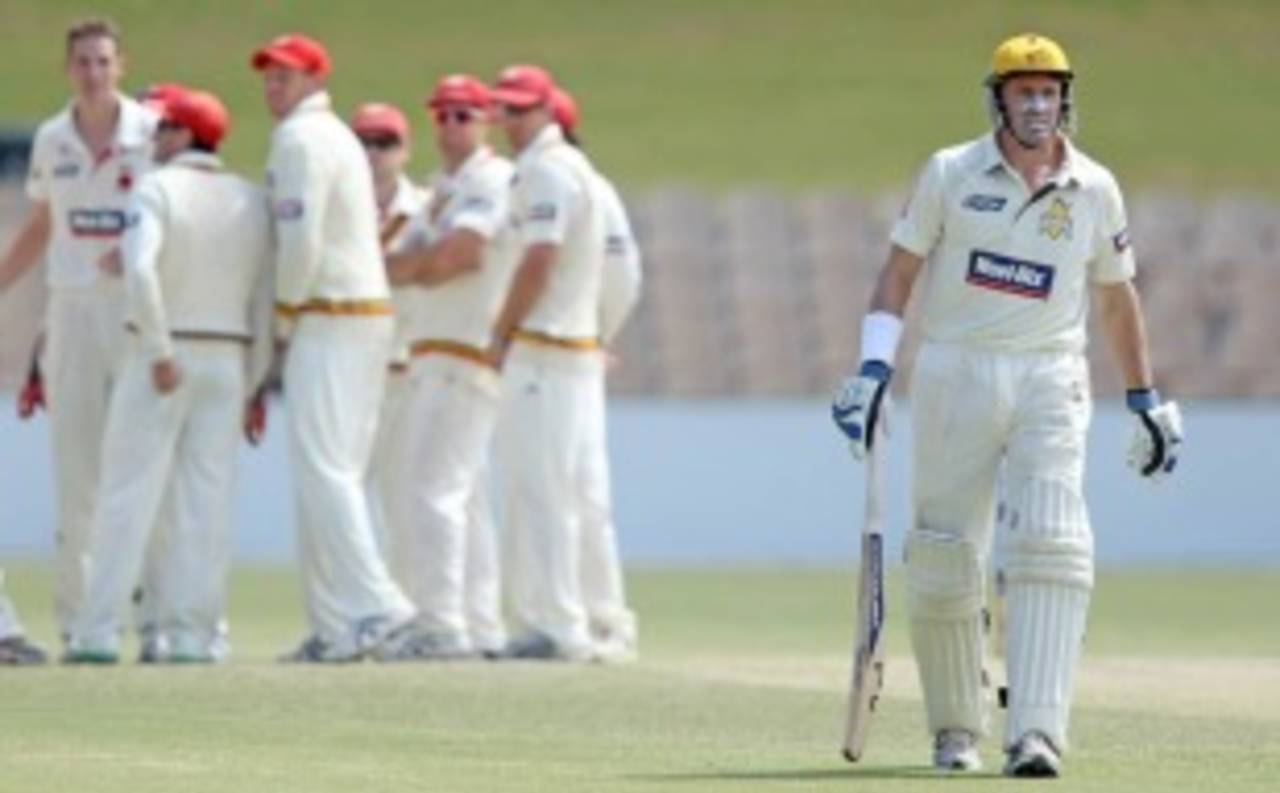Hussey searching for form of relaxation
Future fans and boffins might well dwell on the day, yesterday, that Ricky Ponting added this interesting yet eerie nugget to the collective cricketing wisdom
Christian Ryan
25-Feb-2013

A long, lonely walk: Michael Hussey’s bat hasn’t been in peachy condition • Getty Images
Future fans and boffins might well dwell on the day, yesterday, that Ricky Ponting added this interesting yet eerie nugget to the collective cricketing wisdom. “I don’t,” said Ponting, “think it was so much the bowling in the first innings that got him out. It sounds like he hit a cut shot straight to a bloke in the covers.”
It is interesting because it makes you think. What is form? If – as Mike Hussey did against South Australia on Sunday – you wander out and try first ball to drill Aaron O’Brien through the covers, it suggests a mind and a bat in peachy condition. The ball hitting the cover fieldsman on the chest is a side issue, surely, a case of out of luck not out of form.
It is eerie because Ponting’s words are a rough opposite of an old maxim of Greg Chappell’s. Some unhappy day, after some or other single-digit score, Chappell said something like: “I’m not out of form. It’s just that the bowlers keep getting me out.”
This reverse parallel is something more than an idle curiosity. It is relevant. For Chappell, in his new guise of talent spotter-cum-talent picker-cum-selection panel spokesman, is right now plotting the make-up of Australia’s XI for the Gabba Test. Already he has alluded to an “ageing batting order” and one that has too often “fallen down”; for Hussey, the second oldest and lately the most collapsible of Australia’s batsmen, these words must have been ringing in his ears like a busted alarm clock.
Chappell’s own collapso summer was 1981-82. His plunge – seven ducks in 43 days – was more spectacular than Hussey’s, but the pitches back then were dicier and the bowlers deadlier. In collecting those seven zeroes, Chappell was knocked over by Sarfraz Nawaz, Michael Holding (twice), Colin Croft, Andy Roberts, Joel Garner and (the odd man out in this trivia question) Mudassar Nazar.
Hussey’s runless plain has stretched on longer, and more suffocating, not withstanding today’s singles-fest. It is three years now since his Test average slipped into freefall, from 86 to 49, during which time he has mustered drought-breaking but not quite slate-cleaning hundreds against India, England and Pakistan. Chappell’s calamity earned him a lifetime’s ignominy but actually lasted less than four months, bookended by a gorgeous 235 against Pakistan and a virtuoso 176 in New Zealand. And once he was back, he was back. So supreme was Chappell’s placement during his long-live-the-king Christchurch masterpiece that team-mate Dennis Lillee, watching on the dressing room monitor, cried: “Eat your heart out, Viv Richards.”
How might all this influence Chappell’s Hussey deliberations now? And what possible lessons lie within?
Chappell tried hypnosis, and the mental implantation of concentration and relaxation cues, in his drabbest days. A polite enquiry from West Indian doctor Rudi Webster – “I wonder if you have thought about whether you are watching the ball” – unlocked the riddle. Such offhanded forgetfulness – neglecting to look at the ball – seems the least likely of Hussey’s potential sins. Hussey’s fix on the ball could hardly be steelier; should the wind change, one wonders if he might ever blink again.
Chappell’s biographer, Adrian McGregor, has recorded how fewer people in the dressing room were speaking to Chappell. This, too, seems not to be Hussey’s fate, if his skipper’s emphatic standing by his man is any indication. McGregor also wrote this: “He was tense, worried about his footwork, anxious at the crease and thinking, ‘Come on, bowl so I can score.’”
Thus was Greg Chappell: an uncharacteristically harried Greg Chappell. It could just as easily be a certain West Australian left-hander assuming his typical anxious pose at the wicket. Hussey’s hands squeeze his bat handle so tight that the waft of burning rubber must be ever-present up short-leg’s nose.
Seated next to Chappell at the selection table are two others who have known runless days, sleepless nights. In the case of chairman Andrew Hilditch, he hooked himself all the way to oblivion. As for David Boon, his winter’s travails of 1985 rematerialised ominously in the summer of 1986–87, his young and leaden feet moving in inverse proportion to the hooping ball. “Maybe,” diagnosed Peter Roebuck, “he is simply too stout to move his feet properly.”
Boon ended up, more or less, happily ever after; Hussey might yet too. When salvation came for Chappell, on day one in Christchurch, 1982, he went to stumps 76 not out and promptly downed 17 cans of Fourex. “At last,” wrote McGregor, “Greg had really relaxed.” He carried on carefree the next morning. He never knew real, frightening doubt again.
Could that be Hussey’s lesson? To care a little less? Drink up and be happy a little more?
It is an old and crazy solution, one that runs contrary to conventional wisdom. But, then, Australia have just reappointed as selector an old, unconventional thinker.
Christian Ryan is a writer based in Melbourne. He is the author of Golden Boy: Kim Hughes and the Bad Old Days of Australian Cricket and, most recently Australia: Story of a Cricket Country